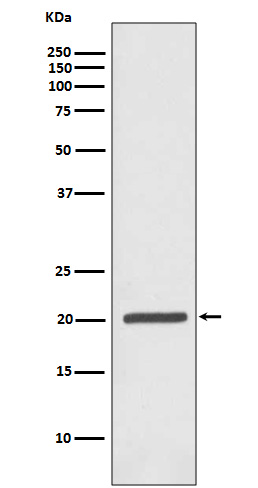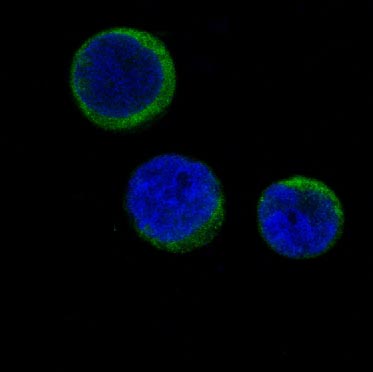

| WB | 咨询技术 | Human,Mouse,Rat |
| IF | 咨询技术 | Human,Mouse,Rat |
| IHC | 咨询技术 | Human,Mouse,Rat |
| ICC | 1/50-1/200 | Human,Mouse,Rat |
| FCM | 咨询技术 | Human,Mouse,Rat |
| Elisa | 咨询技术 | Human,Mouse,Rat |
| Aliases | FTH1; FTH; FTHL6; OK/SW-cl.84; PIG15; Ferritin heavy chain; Ferritin H subunit; Cell proliferation-inducing gene 15 protein |
| Entrez GeneID | 2495 |
| WB Predicted band size | Calculated MW: 21 kDa; Observed MW: 21 kDa |
| Host/Isotype | Rabbit IgG |
| Antibody Type | Primary antibody |
| Storage | Store at 4°C short term. Aliquot and store at -20°C long term. Avoid freeze/thaw cycles. |
| Species Reactivity | Human,Mouse,Rat |
| Immunogen | A synthesized peptide derived from human Ferritin |
| Formulation | Purified antibody in PBS with 0.05% sodium azide. |
+ +
以下是3篇与Ferritin Heavy Chain(FTH1)抗体相关的参考文献及其摘要概括:
1. **"Ferritin heavy chain upregulation by NF-κB inhibits TNFα-induced apoptosis by suppressing reactive oxygen species"**
- 作者:Pham, C. G., et al.
- 摘要:研究通过FTH1抗体检测发现,FTH1在NF-κB通路中被激活,通过减少活性氧(ROS)保护细胞免受TNFα诱导的凋亡,揭示了其在炎症和癌症中的调控机制。
2. **"Iron homeostasis and serum hepcidin in Parkinson's disease: Role of ferritin heavy chain polymorphisms"**
- 作者:Deugnier, Y., et al.
- 摘要:利用FTH1抗体分析帕金森病患者脑组织样本,发现FTH1基因多态性与铁代谢紊乱相关,提示其可能作为神经退行性疾病的生物标志物。
3. **"Development of a novel monoclonal antibody against human ferritin heavy chain for cancer diagnosis"**
- 作者:Wang, L., et al.
- 摘要:报道了一种高特异性抗FTH1单克隆抗体的开发,通过免疫组化(IHC)和ELISA验证其在肝癌组织中的过表达,证明其潜在临床应用价值。
以上文献均通过抗体实验(如Western blot、IHC)解析FTH1在疾病中的功能或诊断应用,涵盖癌症、神经疾病及抗体开发方向。如需具体期刊或年份信息,可进一步补充关键词检索。
Ferritin heavy chain (FTH1) antibodies are essential tools for studying iron metabolism and related cellular processes. Ferritin, a ubiquitous iron-storage protein, comprises 24 subunits of heavy (FTH1) and light (FTL) chains. FTH1 catalyzes the oxidation of Fe²⁺ to Fe³⁺, facilitating safe iron storage and preventing oxidative damage. Antibodies targeting FTH1 are widely used to detect and quantify its expression in tissues or cells, aiding research on iron homeostasis, oxidative stress, and diseases like neurodegenerative disorders, anemia, and cancer.
These antibodies are critical in immunoassays (e.g., Western blot, immunohistochemistry, ELISA) to assess FTH1 levels under varying physiological or pathological conditions. For instance, elevated FTH1 may indicate iron overload, while reduced levels correlate with iron deficiency. They also help explore FTH1's non-canonical roles, such as modulating immune responses or acting as a biomarker in certain cancers. Researchers often validate antibody specificity using knockout models or siRNA-mediated FTH1 depletion. Commercial FTH1 antibodies are typically raised in rabbits or mice, with reactivity across species like human, mouse, and rat. Proper controls are essential due to potential cross-reactivity with FTL or other ferritin isoforms. Overall, FTH1 antibodies are indispensable for unraveling iron-related mechanisms in health and disease.
×